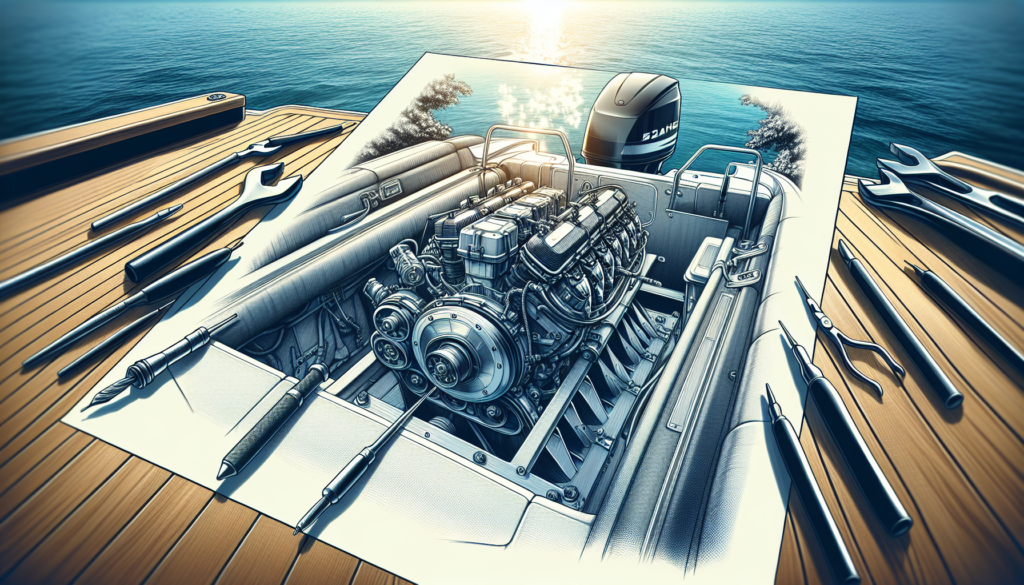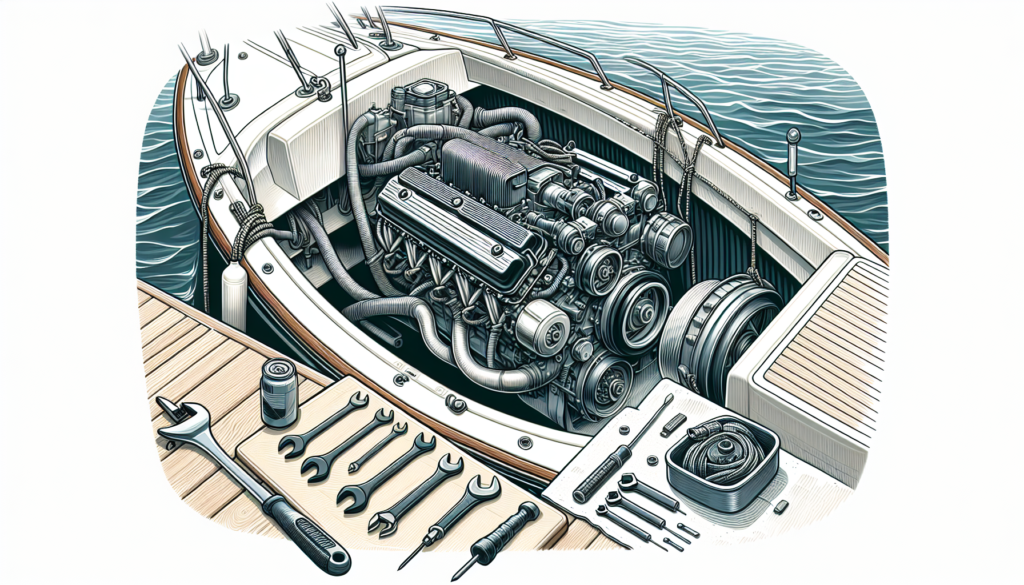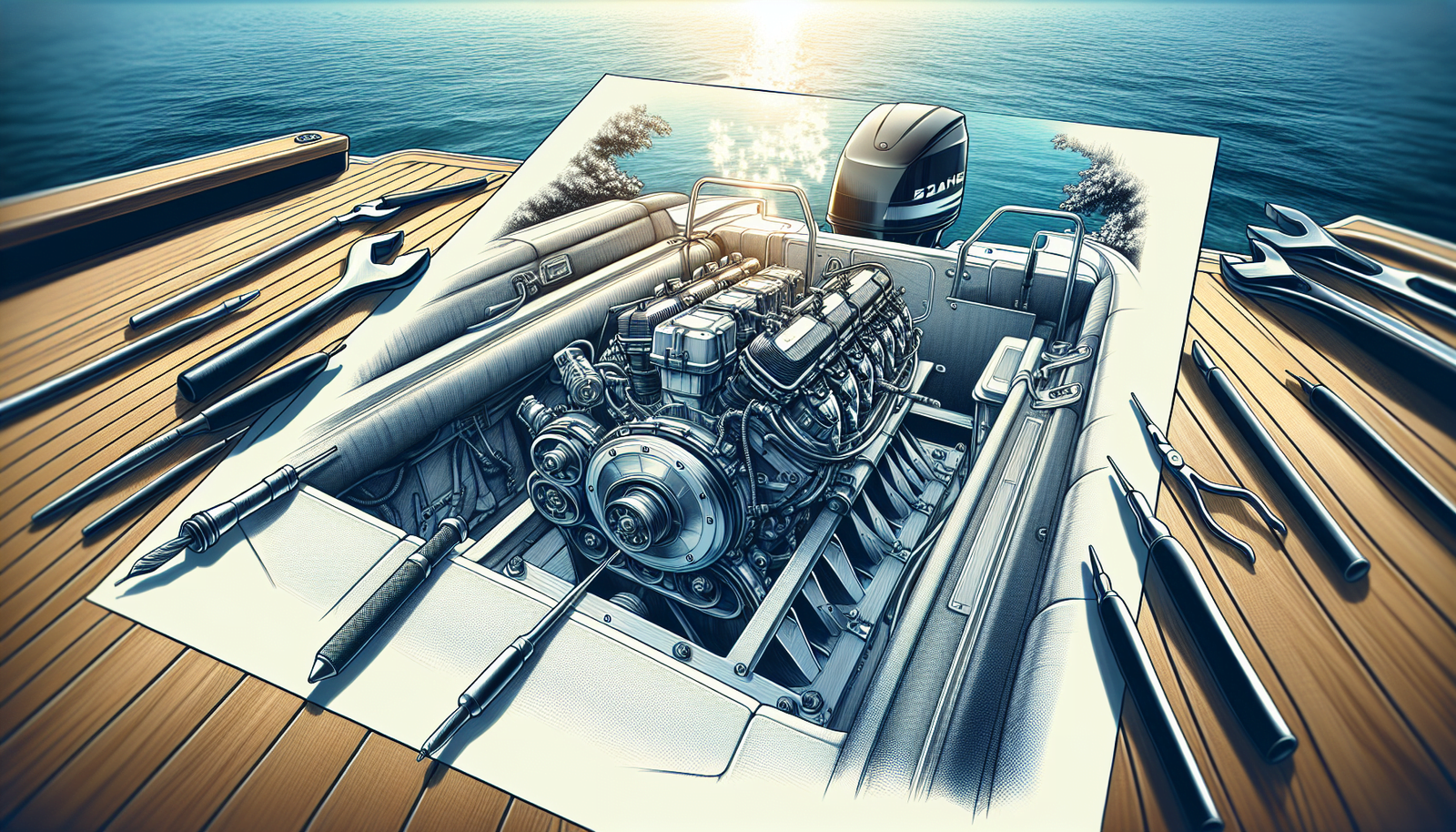Prolonging the life of your boat engine becomes effortless once you’re in the know. “Top 10 Boat Engine Maintenance Tips for Novice Boaters” is an in-depth guide that’s been curated specifically with you in mind. You’ll discover the essential preventive measures and their profound impact on your vessel – setting you on a path of effortless, economical, and efficient boating. As a novice, these effective, easy-to-follow strategies serve as your key to unimpeded cruising, ensuring your maritime adventures remain smooth sailing all the way.

Understanding Your Boat Engine
Boating is a truly enjoyable pastime, and part of the joy is found in understanding and caring for your boat. A vital part of your boat is its engine. It’s the heart of your vessel, and a well-maintained engine ensures smooth sailing.
Getting to know the basic components of your boat engine
For a beginner, a boat engine might seem complicated, but it can be broken down into a few basic components. It typically includes the engine block, pistons, a crankshaft, connecting roads, and valves. Once you familiarize yourself with these basic parts and their functions, understanding engine maintenance becomes simpler.
Recognizing key engine characteristics
How can you tell if your engine is running well? There are several characteristics to observe. The engine performance, its sound, and the vibrations it creates give insights into its health. Regularly check for any unusual noises, smoke or loss of power that might indicate a potential problem.
Understanding the role of the engine in boat functionality
As the powerhouse of your boat, the engine’s well-being directly impacts its performance. Without a smoothly running engine, your boat can’t function optimally. Good boat performance relies on regular engine maintenance.
Regularly Checking and Changing the Oil
Your boat engine’s oil is like its lifeblood. It ensures smooth operation, reduces friction between moving parts, protects against wear and tear, and helps prevent overheating.
The importance of regular oil checks
Consistent oil checks are pivotal to keeping your engine running. Regularly inspect the oil for color and consistency, and make sure the oil level is correct. A drop in oil levels, or a cloudy or milky appearance, could indicate a problem that needs attention.
Understanding oil change requirements for different boat engines
Different engines require different care, and this includes oil changes. Your engine’s manufacturer will provide guidelines on the right type of oil and how often it needs changing. Generally, 4-stroke outboards, inboards, and sterndrive boats require oil changes every 100 hours of operation, or at least once a year.
Performing an oil change on your boat engine
You can perform an oil change yourself—it’s a straightforward process that involves draining the old oil, replacing the oil filter, and adding the fresh oil. Remember that used oil should be disposed of properly as per local regulations.
Fuel System Maintenance
Your boat’s fuel system is integral to its performance. Ensuring its upkeep gives you better mileage and prevents potential issues.
Different types of boat engine fuel
The type of fuel your boat requires is determined by the type of engine it has – gasoline or diesel. Be sure to use the right grade of fuel as recommended by your engine’s manufacturer.
Understanding the role of fuel filters
Fuel Filters play a crucial part in keeping the performance of your engine at its peak. They filter out the dirt and debris that can accumulate in your fuel, which can damage the engine if it reaches the engine’s critical parts.
Checking and changing the fuel filters
Monitor your fuel filters and change them regularly, at least once a season. If your boat encounters rough conditions or is frequently used, you might need to do it more often. Changing fuel filters can be a DIY task, but remember to dispose of the old filters properly.
Ensuring the fuel tank is always clean
Maintaining a clean fuel tank prevents issues like clogs and engine sputtering, which can occur due to debris or water in the fuel. Remember to empty and clean your fuel tank annually.
Belts and Hoses Inspection
The belts and hoses of your boat engine ensure that many of its vital components operate correctly, so their maintenance cannot be overlooked.
Knowing your engine’s belts and hoses
The most common belts in a boat engine are the alternator belt, water pump belt, power steering belt, and the timing belt. Regular inspections will prevent breaks and leaks, which can cause severe damage to the engine.
How to inspect belts and hoses
Check your engine belts for signs of wear, and your hoses for any leaks. You should tighten loose belts and replace those that are worn or cracked immediately to avoid a potential engine breakdown.
Identifying and replacing worn-out belts and hoses
Be on the lookout for visible wear, belt glazing, cracks, bulges or swollen areas on your belts and hoses. If any of these signs appear, it’s time for a replacement.

Keeping the Engine Clean
A clean engine runs smoother and helps you spot any leaks or cracks more easily. Moreover, it extends the life of the engine.
Importance of engine cleanliness
Routine engine cleaning not only leads to smoother performance but also prevents dirt & grime buildup, which can lead to overheating or other issues.
Guidelines for effectively cleaning the engine
Cleaning your engine can be as simple as using a marine degreaser and gently scrubbing the engine with a brush, followed by a rinse with fresh water. Try to clean your engine after every significant trip, especially if your trip included passing through seaweed or sand-filled waters.
Potential issues caused by engine dirt and grime
Grime and dirt can obstruct passages, limit the functionality of moving parts and cause overheating. Cleaning your engine regularly mitigates these risks, ensuring a higher performing engine.
Proper Propeller Care
The propeller has a critical role in your boat’s performance. It provides the push that moves your boat forward, so taking care of your propeller should always be a part of your routine maintenance.
Understanding the role of the propeller
The propeller is essentially the driving force of the boat. It channels power from the engine and uses it to create a thrust that moves the boat forward.
Routine propeller checks
Inspect your propeller regularly for any signs of damage. Even minor distortions can significantly decrease performance and increase fuel consumption, so it’s worth spending some time on regular checks.
Dealing with potential propeller issues
Some propeller issues can be addressed by cleaning or minor repairs, but for others, you may need a propeller replacement. Damages like cracks or bent blades necessitate a replacement. It’s always a good idea to consult with a propeller dealer in these situations.
Propeller cleaning and maintenance
Cleaning the propeller is crucial to remove any potential harmful build-up. After every outing, ensure there are no entangled plant material or fishing lines, which can damage the seals on your outdrive or outboard.
Battery Maintenance
A well-maintained battery ensures that your boat is ready to go when you are. Understanding and performing battery maintenance should be a habitual part of your boat care routine.
Knowing your boat’s battery
Boat batteries are generally either starter batteries, which supply a large amount of power for a short time to start the engine, or deep-cycle batteries, which supply continuous power.
Properly storing, charging, and maintaining batteries
Your battery should be fully charged and stored in a cool, dry place when not in use. Periodically check the battery for corrosion and clean as necessary. Also, always ensure that it is topped up with distilled water if warranted.
Common boat battery problems and solutions
Battery problems can range from failure to charge to dead batteries. Most often, this can be remedied with a good cleaning or replacement of old parts. But sometimes you might just need a new battery.
Cooling System Maintenance
The engine cooling system is essential for engine health, as it prevents overheating by providing a constant supply of cooled water.
Understanding the function of the cooling system
The cooling system operates by using water from the environment to absorb and carry away the engine’s heat, preventing the engine from overheating.
Importance of a functioning cooling system
A malfunctioning cooling system can lead to overheating, causing severe engine damage. Regular maintenance is key to ensure its smooth operation.
Regular cooling system checks and cleaning
Routinely inspect the cooling system for blockages, corrosion, or leaks. Paying special attention to the water pump, a vital component that circulates cooled water through the system.
Rust and Corrosion Prevention
Marine environments are tough on boat engines. Saltwater can be especially detrimental, causing rust and corrosion.
The effects of saltwater on boat engines
Saltwater is corrosive and can quickly accelerate the rusting and deterioration of engine components if left unchecked.
How to identify rust and corrosion
Look for rusty spots or areas of discoloration on the engine and its components. If detected early, it can usually be treated and prevent further spreading.
Preventive measures against rust and corrosion
The most effective measure is regular cleaning and a good rinse with fresh water after every trip. Using corrosion inhibitors and rust-protective paints can also provide additional protection.
Professional Maintenance and Repairs
Even with diligent maintenance, there will always be times when you need the expertise of a professional mechanic.
Knowing when to hire a professional
Certain tricky issues, such as diagnosing engine troubles or replacing intricate components, may be daunting tasks. In such cases, a professional’s experience is invaluable.
Selecting a trusted marine mechanic
Find someone knowledgeable and skilled in the type of engine you have. References from other boat owners or marine businesses are great ways to identify an experienced mechanic.
Regular professional check-ups and servicing
Just like cars, boats also benefit from professional servicing. Regular check-ups ensure that your engine is still in top shape and highlight any potential problems that need to be addressed.
In conclusion, owning and operating a boat should be a pleasure, not a hassle. With the right knowledge and a commitment to regular maintenance, you can ensure your boat engine remains reliable and efficient, ready to embark on your next adventure at sea.


[…] of your boat’s heart – the engine. This article shines a light on the many benefits of Regular boat engine maintenance. With our help, you can ensure your engine’s performance is always top-notch, extending its […]
[…] engine over periodically to prevent parts from sticking, check for signs of rodent infestation, and inspect for rust or any other damage. Maintain the fluid levels and battery charge as […]